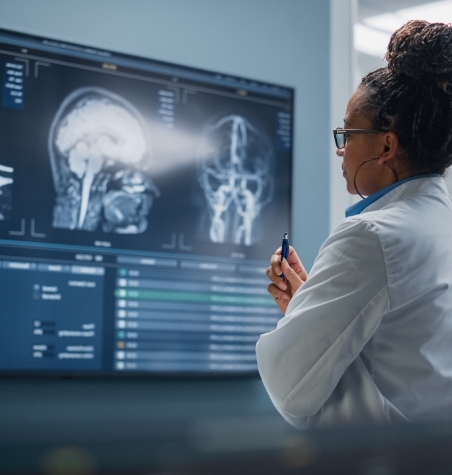Dystonia Treatment Specialists in London
Dystonia is an umbrella term for a range of movement disorders. It is a neurological condition, although cognitive function typically remains unaffected. At Dementech Neurosciences, we provide a range of private dystonia treatment options for the five main variations of the condition, helping patients to effectively manage their symptoms and maintain a good quality of life.

![]()
![]()
![]()
![]()
![]()
![]()
![]()
What is Dystonia and Why Consider Dystonia Treatment?
Dystonias are neurological movement disorders affecting different parts of the body and causing involuntary muscle contractions, some of which are painful. There are five main types of dystonia:
- Focal dystonia – this type of dystonia affects one part of the body only, with cervical dystonia being a common example (affecting around 40,000 people in the UK)
- Segmental dystonia – this type of dystonia affects two or more areas of the body that are connected, such as cranial dystonia which can affect the jaw and tongue
- Multifocal dystonia – this type of dystonia relates to two or more unconnected areas of the body, such as an arm and a leg
- Generalised dystonia – this affects the trunk of the body and at least two other unconnected areas
- Hemidystonia – this type of dystonia affects an entire side of the body
In around 90% of cases, the patient will have cervical dystonia (in the neck) or blepharospasm (in the eyelids). Generally speaking, these conditions don’t get worse and no other body parts are affected, though treatment is required. At Dementech Neurosciences, we offer a multidisciplinary approach to treating the symptoms of dystonia with our clinicians and therapists, helping you to mitigate your symptoms and live a high quality of life.
Dystonia Diagnosis & Treatment at Dementech
Accurately diagnosing dystonia is essential for the right treatment plan to be put in place. In order for a diagnosis to be made, a neurologist will need to carry out a series of tests and assessments.
At Dementech Neurosciences, our expert neurologists will provide a comprehensive assessment of the type and severity of this movement disorder for your individual case. To ensure an accurate diagnosis, we will test extensively to form a complete picture of every patient’s condition stage. This may include looking at your family history, doing blood and urine tests, and doing a brain scan.
Dystonia Diagnosis & Treatment at Dementech
The treatment for dystonia includes small amounts of fillers that are injected in the muscles. This is done so that they can block nerve signals that tell the muscles to contract. The effect of the treatment is temporary and lasts for about 12 weeks, but results might vary based on the individual case. Botulinum toxin injections are an example.
Patients treated with botulinum toxin injections can feel the effects from three days to two weeks following treatments, with the effects lasting approximately 3 months.
Other types of treatment may include muscle relaxant medications, physiotherapy to improve your movement and posture, and surgery if other types of treatment don’t work.
Technology Used For Dystonia Treatment
In order to find the right type of treatment, it’s important that an accurate diagnosis is made the first time. At Dementech Neurosciences, we have access to the highest quality diagnostic equipment, allowing us to carry out in-depth brain scans so we can clearly see the areas of the brain that are affected and if there’s another condition at play.
We also work with a number of leading clinics across London where you can go for blood tests. Using rapid testing technology, we will have the results back within 48 hours.
Combined with the experience of our neurologists, we are able to quickly and accurately diagnose you, as well as identify the extent of your condition and provide access to the most relevant treatments.
Book A Consultation
Speak to an Dystonia Treatment Specialist
0203 848 4500
Dementech Neurosciences are London's leading neurological clinic specialising in advanced neurological conditions such as Vascular Dementia. Book a call with our clinic to speak to a specialist on your condition.
Symptoms of Dystonia
Dystonia is a neurological disorder that manifests differently in individuals. It encompasses a wide range of symptoms that can significantly impact a person’s daily life. In this article, we’ll explore the various facets of dystonia, including its common symptoms, the areas of the body it affects, and the factors that influence its severity.
Dystonia affects different people in varying ways. Some of the most common symptoms include:
- Uncontrollable Muscle Spasms: Individuals with dystonia often experience involuntary muscle contractions, leading to jerky movements and spasms.
- Painful Muscle Cramps: Muscle cramps can be a distressing symptom of dystonia, causing discomfort and pain.
- Twisting Body Parts: Dystonia can cause certain body parts, such as the feet or neck, to twist involuntarily, leading to postural changes.
- Tremors and Shaking: Shaking and tremors may occur in affected areas, affecting fine motor control.
- Uncontrollable Blinking: Some forms of dystonia can lead to uncontrollable blinking or other facial muscle contractions.
Dystonia is characterised by its diverse onset and affected areas. Key points to consider include:
- Onset in Different Areas: Symptoms can begin in one area of the body, such as the neck, arm, or leg. This variability in onset contributes to the uniqueness of each person’s experience with dystonia.
- Focal Dystonia: Focal dystonia typically emerges after the age of 21 and frequently affects the face, arm, or neck. It often remains localized in these areas, further highlighting the condition’s heterogeneity.
- Action-Induced Symptoms: Dystonia symptoms can be triggered or exacerbated by specific actions, such as playing a musical instrument or engaging in writing activities.
- Impact of Stress and Fatigue: Stress, anxiety, and fatigue can intensify dystonic symptoms, making it crucial to manage these factors for those living with the condition.
Dystonia is not always immediately noticeable, and its progression can be subtle but significant:
- Gradual Manifestation: Symptoms of dystonia may develop gradually, with individuals initially experiencing mild discomfort or occasional muscle spasms.
- Increasing Severity: Over time, these symptoms can become more pronounced and disruptive to daily life, highlighting the importance of early diagnosis and intervention.

Anonymous

Patient Success Stories
Dementech Neurosciences prides itself on delivering exceptional patient care. Here are just some of our patient testimonials.

P Allen

“My family and I experienced one of the hardest times of our lives having to deal with my wife’s deteriorating condition. I would like to personally thank the lovely young lady Zobiaa from Dementech, for showering us with compassion, empathy and genuine care and concern. Her professionalism, high-level customer service and communication, eye for detail, and willingness to go the extra mile to accommodate our needs and make not only my wife, but our whole family, feel as comfortable and supported as possible, is something we will always be grateful for. Thank you so much for your friendly and polite presence Zobiaa and taking the time and effort to build a relationship with us. You really made our visits to the clinic a positive, 5 star experience.”

Anonymous

“Dementech Neurosciences is a relatively new clinic specialising in the scientific assessment and treatment of Parkinson’s Disease. It represents a significant development in the treatment of Parkinson’s and has done a great job of establishing itself and its reputation in a short period of time. The premises are extremely well situated in central London, the consultant neurologists are all at the top of their field in their specialisation of the treatment of Parkinson’s Disease, and the clinical and administrative staff are of a similar standard. The atmosphere of the clinic is positive and the results, in the short period of time I have been able to assess, have been similarly positive.”

N Mohammed

“Have had nothing but kindness and professionalism from Dementech and all their staff. From their initial guidance by Shakeela, through to staff conducting the MRI tests and Dr. Lucio D’Anna for his expertise clarity of explanation, compassion and consideration. Special mention to Zobia, who saved the day with her quick thinking that helped my mother-in-law to obtain extended care. Overall a perfect experience. Cannot recommend them enough.”
Areas of the body that Dystonia can affect:
Dystonia is a neurological disorder that can manifest in different ways, affecting various parts of the body. Below are some of the most common types of dystonia and the specific areas they impact:
Excessive Blinking: Blepharospasm involves involuntary contractions of the muscles around the eyes, leading to frequent blinking and spasms that can obstruct vision.
Painful Muscle Contractions: Cervical dystonia is characterized by uncontrollable and often painful muscle contractions in the neck, resulting in awkward postures and discomfort.
Voice Changes: Laryngeal dystonia affects the vocal cords, causing involuntary spasms that alter the quality of one’s voice, making speech difficult and unpredictable.
Hand Movements Affected: Limb dystonia leads to involuntary movements, cramps, or tremors in the hand or arm muscles, often triggered by activities like handwriting or playing musical instruments.
Twisting and Pain: Foot dystonia involves uncontrollable and painful muscle contractions in the foot, resulting in a twisting or turning of the foot.

J Adams

A pleasure to have the expertise, vision & support of Dementech, most especially the care and trust of Dr. D’Anna, Anca and the team!
Meet Our Specialists
Dementech, based in London, is renowned for its exceptional team of specialists in Essential Tremor (ET). Globally recognised for their unparalleled expertise, these professionals are at the forefront of pioneering research, diagnosis, and treatment strategies for ET. They exhibit an unwavering commitment to enhancing the well-being of ET patients. Benefiting from access to state-of-the-art medical facilities and resources, Dementech’s experts offer comprehensive care and precision-tailored therapies designed to meet the unique needs of each ET patient. Whether they are advancing our understanding of ET through groundbreaking research or crafting personalised treatment plans to enhance the quality of life for those affected, Dementech’s neurological specialists are celebrated for their steadfast dedication to addressing this complex neurodegenerative condition.
Prof. K. Ray Chaudhuri – Parkinson’s Specialist in London
Medical & Scientific Advisory Board
Neurologist
Parkinson's Disease
Dr Lucio D’Anna – Consultant Neurologist in London
Lead Specialist
Memory Clinic
Neurologist
Private Neurology
Stroke Treatment
Dr Nikolay Dimitrov – Consultant Neurologist in London
Movement Disorders
Neurologist
Parkinson's Disease
Private Neurology
Dietician
Dr Kish Mankad MRCP FRCR – Paediatric Neuroradiology Specialist
Neuro Radiologist
Dr Gayatri Vadlamani – Consultant Paediatric Neurologist
Paediatric Neurodisability
Dr Tahira Choudry – Consultant Neurologist
Epilepsy
Movement Disorders
Neurologist
Parkinson's Disease
Private Neurology
Aleksandra Podlewska – Neuropsychologist
Neuropsychologist
Dr. Maria Papachatzaki – Consultant Neurologist, MS Specialist
Epilepsy
Multiple Sclerosis
Neurologist
Private Neurology
Dr. Stylianos Arseniou – Consultant Clinical Neurophysiologist
Neuropsychologist
Dr Catherine Anosike – Consultant Psychiatrist
Psychologist
Psychiatrist
Latest blog posts & guides
17th July 2024
Effective Money Management Tips for People with ADHD
Managing finances can be challenging for anyone, but for those with ADHD (Attention Deficit Hyperactivity Disorder), it can be especially...
17th July 2024
How to Talk to Someone with Short Term Memory Loss
Communicating effectively with someone experiencing short-term memory loss can be challenging but is essential for their well-being and your relationship...
17th July 2024
Occupational Therapy Treatments for Autism: What to Expect
Autism Spectrum Disorder (ASD) presents unique challenges that can affect various aspects of daily living, from communication to motor skills....
About Dementech
At our core, we are dedicated to enhancing your quality of life and overall well-being by delivering the highest standard of care. Recognising the need for a private centre that offers a holistic, multidisciplinary approach, we’ve embarked on a mission to transform the lives of individuals facing neurological disorders.
Our commitment to this mission is fueled by the integration of cutting-edge technologies and advanced diagnostic methods, some of which are considered the best in the world. Although many of the neurological disorders we specialise in remain incurable, our focus on medication and other therapeutic modalities can effectively slow down disease progression and bring about substantial improvements in the patient’s quality of life.
Contact Dementech
Take the first step towards a better quality of life – contact our clinic today.
Call us on 0203 848 4500





